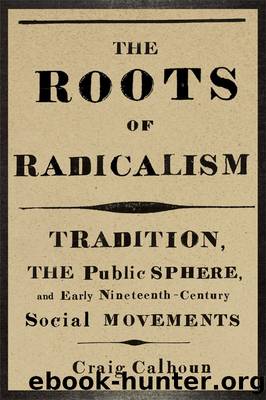The Roots of Radicalism by Craig Calhoun

Author:Craig Calhoun [Calhoun, Craig]
Language: eng
Format: epub
Tags: History, General, Europe, France, Great Britain, United States, 19th Century, Social Science, Sociology
ISBN: 9780226090849
Google: 1-VdKaE3m9AC
Publisher: University of Chicago Press
Published: 2012-03-09T16:00:03+00:00
CHAPTER EIGHT
Classical Social Theory and the French Revolution of 1848
To Alexis de Tocqueville and Karl Marx, sociologically the foremost among contemporary observers, the mid-nineteenth century revolutions seemed not only echoes of 1789 and other predecessors but also harbingers of something new. Tocqueville saw a threat to social order in the increasing protests of 1847 and 1848, which were posed not just by revolution but also by the eruption of an insidious, continually growing, struggle of class against class. In October 1847, Tocqueville (not unlike Marx) drafted a manifesto (planned for publication by a group of parliamentary associates though never in fact published). He identified the actors in political struggle in terms of underlying economic identities:
Soon the political struggle will be between the Haves and the Have-nots; property will be the great battlefield; and the main political questions will turn on the more or less profound modifications of the rights of property owners that are to be made. Then we shall again see great public agitations and great political parties.1
Marx also saw the struggle in class terms, of course, and blamed the bourgeoisie for forcing the workers into combat. Like Tocqueville, he saw the future presaged in the June Days:
The workers were left no choice; they had to starve or take action. They answered on June 22 with the tremendous insurrection in which the first great battle was fought between the two classes that split modern society. It was a fight for the preservation or annihilation of the bourgeois order. The veil that shrouded the republic was torn asunder.2
Liberal republicans had formulated the notion of permanent revolution in the early nineteenth century, but it was amid the defeats of 1848 that it came to take on the meaning not of gradual reform but of a need to extend the revolutionary struggle beyond bourgeois limits. For Marx,
While the democratic petty bourgeois wish to bring the revolution to a conclusion as quickly as possible, and with the achievement, at most, of the above demands, it is our interest and our task to make the revolution permanent, until all more or less possessing classes have been forced out of their position of dominance, the proletariat has conquered state power, and the association of proletarians, not only in one country but in all the dominant countries of the world, has advanced so far that competition among the proletarians in these countries has ceased and that at least the decisive productive forces are concentrated in the hands of the proletarians.3
Yet the revolution was not permanent, and the struggles of 1848â51 were among the last major upheavals of a passing revolutionary era rather than a new beginning.
In this chapter, I want to suggest a few ways in which the French revolution of 1848 helped to shape classical social theory. Three of the classic founding fathers of sociology (Auguste Comte, Karl Marx, and Alexis de Tocqueville) were contemporary observers of the revolution of 1848 in France. In addition, another important theoretical tradition was represented in contemporary observations of 1848 by Pierre-Joseph Proudhon.
Download
This site does not store any files on its server. We only index and link to content provided by other sites. Please contact the content providers to delete copyright contents if any and email us, we'll remove relevant links or contents immediately.
| United States | Abolition |
| Campaigns & Battlefields | Confederacy |
| Naval Operations | Regimental Histories |
| Women |
In Cold Blood by Truman Capote(3374)
The Innovators: How a Group of Hackers, Geniuses, and Geeks Created the Digital Revolution by Walter Isaacson(3146)
Steve Jobs by Walter Isaacson(2889)
All the President's Men by Carl Bernstein & Bob Woodward(2363)
Lonely Planet New York City by Lonely Planet(2217)
And the Band Played On by Randy Shilts(2197)
The Room Where It Happened by John Bolton;(2150)
The Poisoner's Handbook by Deborah Blum(2135)
The Innovators by Walter Isaacson(2098)
The Murder of Marilyn Monroe by Jay Margolis(2095)
Lincoln by David Herbert Donald(1982)
A Colony in a Nation by Chris Hayes(1927)
Being George Washington by Beck Glenn(1912)
Under the Banner of Heaven: A Story of Violent Faith by Jon Krakauer(1788)
Amelia Earhart by Doris L. Rich(1689)
The Unsettlers by Mark Sundeen(1682)
Dirt by Bill Buford(1670)
Birdmen by Lawrence Goldstone(1662)
Zeitoun by Dave Eggers(1643)
